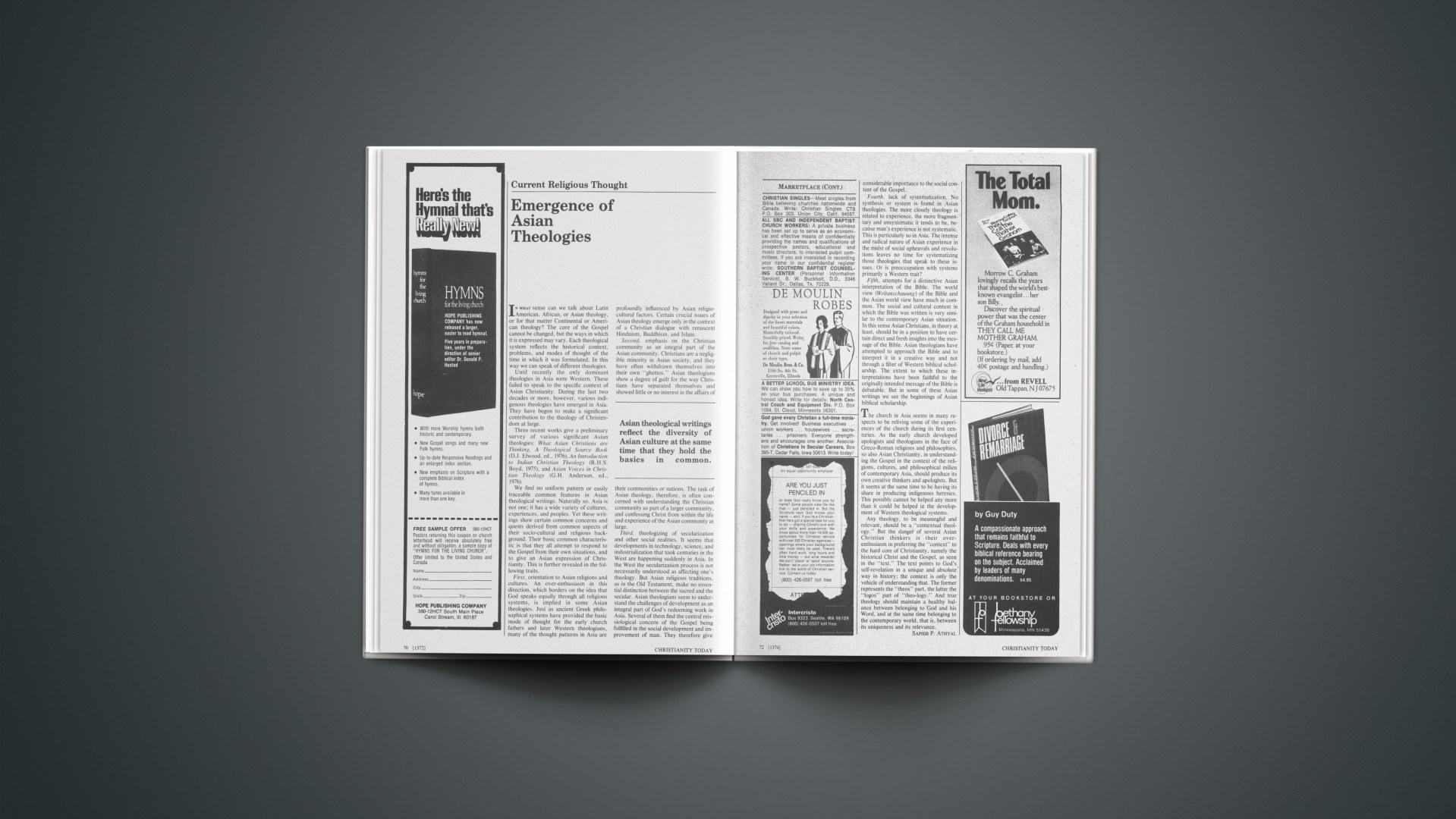In what sense can we talk about Latin American, African, or Asian theology, or for that matter Continental or American theology? The core of the Gospel cannot be changed, but the ways in which it is expressed may vary. Each theological system reflects the historical context, problems, and modes of thought of the time in which it was formulated. In this way we can speak of different theologies.
Until recently the only dominant theologies in Asia were Western. These failed to speak to the specific context of Asian Christianity. During the last two decades or more, however, various indigenous theologies have emerged in Asia. They have begun to make a significant contribution to the theology of Christendom at large.
Three recent works give a preliminary survey of various significant Asian theologies: What Asian Christians are Thinking, A Theological Source Book (D.J. Elwood, ed., 1976), An Introduction to Indian Christian Theology (R.H.S. Boyd, 1975), and Asian Voices in Christian Theology (G.H. Anderson, ed., 1976).
We find no uniform pattern or easily traceable common features in Asian theological writings. Naturally so. Asia is not one; it has a wide variety of cultures, experiences, and peoples. Yet these writings show certain common concerns and quests derived from common aspects of their socio-cultural and religious background. Their basic common characteristic is that they all attempt to respond to the Gospel from their own situations, and to give an Asian expression of Christianity. This is further revealed in the following traits.
First, orientation to Asian religions and cultures. An over-enthusiasm in this direction, which borders on the idea that God speaks equally through all religious systems, is implied in some Asian theologies. Just as ancient Greek philosophical systems have provided the basic mode of thought for the early church fathers and later Western theologians, many of the thought patterns in Asia are profoundly influenced by Asian religio-cultural factors. Certain crucial issues of Asian theology emerge only in the context of a Christian dialogue with renascent Hinduism, Buddhism, and Islam.
Second, emphasis on the Christian community as an integral part of the Asian community. Christians are a negligible minority in Asian society, and they have often withdrawn themselves into their own “ghettos.” Asian theologians show a degree of guilt for the way Christians have separated themselves and showed little or no interest in the affairs of their communities or nations. The task of Asian theology, therefore, is often concerned with understanding the Christian community as part of a larger community, and confessing Christ from within the life and experience of the Asian community at large.
Third, theologizing of secularization and other social realities. It seems that developments in technology, science, and industrialization that took centuries in the West are happening suddenly in Asia. In the West the secularization process is not necessarily understood as affecting one’s theology. But Asian religious traditions, as in the Old Testament, make no essential distinction between the sacred and the secular. Asian theologians seem to understand the challenges of development as an integral part of God’s redeeming work in Asia. Several of them find the central missiological concern of the Gospel being fulfilled in the social development and improvement of man. They therefore give considerable importance to the social content of the Gospel.
Fourth, lack of systematization. No synthesis or system is found in Asian theologies. The more closely theology is related to experience, the more fragmentary and unsystematic it tends to be, because man’s experience is not systematic. This is particularly so in Asia. The intense and radical nature of Asian experience in the midst of social upheavals and revolutions leaves no time for systematizing those theologies that speak to these issues. Or is preoccupation with systems primarily a Western trait?
Fifth, attempts for a distinctive Asian interpretation of the Bible. The world view (Weltanschauung) of the Bible and the Asian world view have much in common. The social and cultural context in which the Bible was written is very similar to the contemporary Asian situation. In this sense Asian Christians, in theory at least, should be in a position to have certain direct and fresh insights into the message of the Bible. Asian theologians have attempted to approach the Bible and to interpret it in a creative way and not through a filter of Western biblical scholarship. The extent to which these interpretations have been faithful to the originally intended message of the Bible is debatable. But in some of these Asian writings we see the beginnings of Asian biblical scholarship.
The church in Asia seems in many respects to be reliving some of the experiences of the church during its first centuries. As the early church developed apologists and theologians in the face of Greco-Roman religions and philosophies, so also Asian Christianity, in understanding the Gospel in the context of the religions, cultures, and philosophical milieu of contemporary Asia, should produce its own creative thinkers and apologists. But it seems at the same time to be having its share in producing indigenous heresies. This possibly cannot be helped any more than it could be helped in the development of Western theological systems.
Any theology, to be meaningful and relevant, should be a “contextual theology.” But the danger of several Asian Christian thinkers is their overenthusiasm in preferring the “context” to the hard core of Christianity, namely the historical Christ and the Gospel, as seen in the “text.” The text points to God’s self-revelation in a unique and absolute way in history; the context is only the vehicle of understanding that. The former represents the “theos” part, the latter the “logos” part of “theology.” And true theology should maintain a healthy balance between belonging to God and his Word, and at the same time belonging to the contemporary world, that is, between its uniqueness and its relevance.
SAPHIR P. ATHYAL









